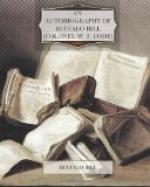Instantly concluding that Harrington had returned, I was about to cry out in delight when I caught a glimpse of a war-bonnet, surmounting the ugly, painted face of a Sioux brave.
The brilliant colors that had been smeared on his visage told me more forcibly than words could have done that his tribe was on the warpath. It was a decidedly unpleasant discovery for me.
While he was asking me in the Sioux language what I was doing there, and how many more were in the party, other braves began crowding through the door till the little dugout was packed as full of Sioux warriors as it could hold.
Outside I could hear the stamping of horses and the voices of more warriors. I made up my mind it was all over but the scalping.
And then a stately old brave worked his way through the crowd and came toward my bunk. It was plain from the deference accorded him by the others that he was a chief. And as soon as I set eyes on him I recognized him as old Rain-in-the-Face, whom I had often seen and talked with at Fort Laramie, and whose children taught me the Sioux language as we played about the wagon-beds together. Among these children was the son who succeeded to the name of Rain-in-the-Face, and who years later, it is asserted, killed General George A. Custer in the massacre of the Little Big Horn.
I showed the chief my broken leg, and asked him if he did not remember me. He replied that he did. I asked him if he intended to kill the boy who had been his children’s playmate. He consulted with his warriors, who had begun busily to loot the cabin. After a long parley the old man told me that my life would be spared, but my gun and pistol and all my provisions would be regarded as the spoils of the war.
Vainly I pointed out that he might as well kill me as leave me without food or the means to defend myself against wolves. He said that his young men had granted a great deal in consenting to spare my life. As for food, he pointed to the carcass of a deer that hung from the wall.
The next morning they mounted their ponies and galloped away. I was glad enough to see them go. I knew that my life had hung by a thread while I had been their involuntary host. Only my friendship with the children of old Rain-in-the-Face had saved me.
But, even with the Indians gone, I was in a desperate situation. As they had taken all my matches I had to keep the fire going continuously. This meant that I could not sleep long at a time, the lack of rest soon began to tell on me. I would cut slices from the deer carcass with my knife, and holding it over the fire with a long stick, cook it, eating it without salt. Coffee I must do without altogether.
The second day after the departure of the Indians a great snow fell. The drifts blocked the doorway and covered the windows. It lay to a depth of several feet on the roof over my head. My woodpile was covered by the snow that drifted in and it was with great difficulty that I could get enough wood to keep my little fire going. And on that fire depended my life. Worse than all these troubles was the knowledge that the heavy snow would be sure to delay Harrington.




